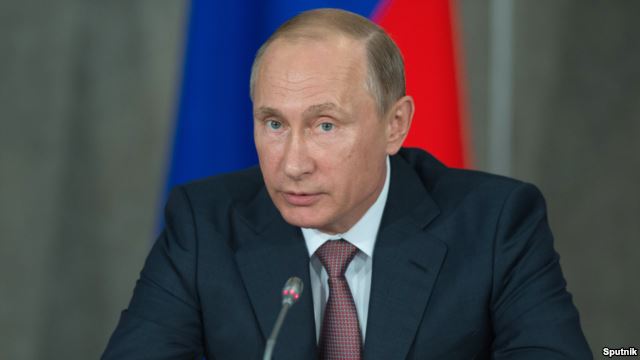Russia: Putin warns Crimean Tatars not to seek special status
| Publisher | Radio Free Europe/Radio Liberty |
| Publication Date | 18 August 2015 |
| Cite as | Radio Free Europe/Radio Liberty, Russia: Putin warns Crimean Tatars not to seek special status, 18 August 2015, available at: http://www.refworld.org/docid/55ee96d8e.html [accessed 24 December 2015] |
| Disclaimer | This is not a UNHCR publication. UNHCR is not responsible for, nor does it necessarily endorse, its content. Any views expressed are solely those of the author or publisher and do not necessarily reflect those of UNHCR, the United Nations or its Member States. |
August 18, 2015
By RFE/RL
 Russian President Vladimir Putin holds a meeting of the State Council's presidium on tourism development in Crimea on August 17.
Russian President Vladimir Putin holds a meeting of the State Council's presidium on tourism development in Crimea on August 17.
Russian President Vladimir Putin has warned minority ethnic Tatars that they should not strive for special status on the Crimean Peninsula, which Moscow annexed from Ukraine last year.
Muslim Tatars compose more than 10 percent of Crimea's population and largely opposed the Russian takeover last year, mindful of the mass deportations under Soviet dictator Josef Stalin during World War II. They have come under pressure to align themselves with the new authorities since the annexation.
On a three-day visit to Crimea to promote tourism and development, Putin met representatives of various minorities on August 17, including the Tatars, at a luxury resort in the village of Opolznevoye.
"Interethnic relations are a delicate matter," Putin told the envoys. "I see any speculation on any sort of special rights for one particular ethnicity as extremely dangerous."
Putin suggested that foreign countries were funding rights activists in an effort to "destabilize the situation" by playing up problems faced by Crimean Tatars, the third-largest ethnic group after Russians and Ukrainians on the peninsula, and said that Moscow would not allow this.
"You and I know full well who we are talking about. There are a number people who consider themselves professional fighters for rights," he said, adding that "they want to receive foreign grants and acknowledgement and realize their ambitions, including political ambitions."
"Crimea is essentially a mirror of multiethnic Russia. Here, like everywhere in Russia, we need to pay the utmost, constant attention to building greater peace and harmony, combining the efforts of the state authorities and civil society," Putin said. "I therefore consider this meeting with you...very important indeed."
Russia has drawn criticism from the European rights watchdog OSCE, the United Nations, Council of Europe, and Turkey for its treatment of the Turkic-speaking minority. The Tatars are distrustful of Moscow after the 1944 mass deportation of their kin, which many did not survive.
Tatars started returning to Crimea in large numbers after the breakup of the Soviet Union in 1991, and enjoyed a cultural revival within Ukraine.
Since the March 2014 annexation, Russian security forces have raided their main assembly, or Mejlis, and evicted them from the premises. Russia also silenced the Tatars' television broadcaster, ATR.
Several local Tatar activists were reportedly killed, beaten, or went missing. Two top leaders of the community were barred from Crimea.
In March, a year after the Russian takeover, the U.S. State Department said that "the human rights situation in Crimea has deteriorated dramatically, with mounting repression of minority communities and faiths, in particular Crimean Tatars, and systematic denial of fundamental freedoms."
Moscow has also made conciliatory gestures to win the Crimean Tatars over. It granted them legal rehabilitation along with other ethnic minorities who suffered under Stalin – though critics say this was merely a technicality – and accorded official status to their language.
Putin offered longtime Tatar residents of Crimea Russian citizenship on his visit.
While trying to inhibit the work of Crimean Tatars loyal to Kyiv, Moscow has sought to promote new Tatar groups that would be willing to cooperate with the Kremlin.
The mix of pressure and promises has left Crimean Tatars increasingly split over whether to resist or deal with Russia.
With reporting by Reuters, TASS, and Interfax
Link to original story on RFE/RL website
